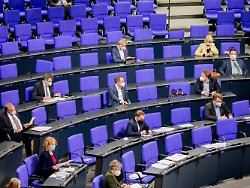Friday March 26th 2021
With many exceptions
Bundestag resolves lobby register
Under the impression of several alleged cases of corruption in the Union, the Bundestag passed a public lobby register. Critics consider the transparency offensive to be a fig leaf. The measures decided did not go far enough.
After years of discussion, the Bundestag decided to introduce a lobby register. The law, which was passed late Thursday evening, obliges professional interest groups to enter themselves in a publicly accessible register and to provide information about their clients there. This is intended to make it clearer in the future who has influenced political decisions and legislation.
Lobbyists who want to assert the interests of certain groups in the Bundestag or the federal government must provide information on their employers or clients as well as the number of employees and the financial expenses for lobbying in the new register. Meetings in ministries should be recorded down to the sub-department head level. The register is kept digitally at the Bundestag. Anyone who does not follow the rules can expect a fine of up to 50,000 euros.
Criticism also from lobbyists
The CDU MP Patrick Schnieder said that lobbying is not a bad thing per se, but that it must be made transparent. However, the opposition does not consider the regulations negotiated by the grand coalition to be sufficient. Transparency International also complained about major shortcomings. “We will not get any transparency about the concrete lobbying work in the future either, or at most a very thin one,” said the organization’s head of Germany, Hartmut Bäumer, in the “Augsburger Allgemeine”. The chief lobbyist of the German Chemical Industry Association (VCI), Norbert Theihs, also joined the criticism from Transparency International. There is a long list of exceptions of associations and organizations that do not have to be entered in the register, said Theis. “There are large groups, such as the churches, trade unions, employers’ associations and lawyers, that are not or insufficiently covered by the law,” he said.
Even the SPD would have liked more extensive regulations in the joint draft law of the grand coalition. Matthias Bartke, who negotiated the compromise with the CDU and CSU on behalf of the Social Democrats, called it a “major downer in the Bundestag” that the Union had prevented the “executive footprint”. This instrument is intended to show how legal texts have been changed specifically through the intervention of lobbyists. For the legal advisor of the Union parliamentary group, Michael Frieser, this would be “maddening bureaucratic administration”, according to the CSU politician.
.
